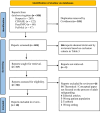Safeguarding adults: A concept analysis
- PMID: 38943338
- PMCID: PMC11638518
- DOI: 10.1111/jan.16306
Safeguarding adults: A concept analysis
Abstract
Aims: This article aimed to examine the concept of safeguarding adults and establish an operational definition for application to practice, research and policy.
Design: Rodgers' evolutionary and inductive method of concept analysis was used.
Data sources: A systematic search was conducted across four electronic databases, CINAHL, PsycINFO, Scopus and PubMed, covering the period from January 2014 to May 2023. This systematic database search aimed to gather a broad spectrum of research and scholarly literature to inform and support the concept analysis. A total of 10 peer-reviewed articles were reviewed using a data chart to identify the context, definitions, antecedents, attributes and consequences of safeguarding adults.
Results: The analysis of the included articles helped to develop a better understanding of safeguarding adults by offering a practical operational definition tailored to the specific needs of practising nurses. The implications for practice, research and policy are discussed, highlighting the potential for improving the quality of care and ensuring the well-being of adults at risk of abuse.
Conclusion: By employing Rogers' evolutionary concept analysis method, we developed a deeper insight into safeguarding adults in health care. A synthesis of literature revealed the intricate layers and adaptations within safeguarding practices. This concept analysis lays the groundwork for future research, policy development and educational initiatives, enhancing the well-being and safety of adults at risk of abuse within care.
Impact: By undertaking a concept analysis of the term safeguarding adults' nurses can be more prepared to engage in and reinforce the key principles of safeguarding adults, providing guidance to ensure the protection and well-being of adults at risk of abuse.
Patient or public contribution: Not applicable.
What this paper contributes to the wider body of knowledge: This concept analysis helps to define and clarify the conceptual term 'safeguarding adults' promoting a shared understanding of the key components of adult protection and providing a comprehensive framework for assessment and management of adults at risk of abuse in this field of practice.
Keywords: abuse; concept analysis; nursing; safeguarding adults.
© 2024 The Author(s). Journal of Advanced Nursing published by John Wiley & Sons Ltd.
Conflict of interest statement
The authors have no conflict of interest to declare.
Figures
Similar articles
-
The meaning of preparedness for informal caregivers of older adults: A concept analysis.J Adv Nurs. 2024 Jun;80(6):2308-2324. doi: 10.1111/jan.15999. Epub 2023 Dec 2. J Adv Nurs. 2024. PMID: 38041594
-
Beyond the black stump: rapid reviews of health research issues affecting regional, rural and remote Australia.Med J Aust. 2020 Dec;213 Suppl 11:S3-S32.e1. doi: 10.5694/mja2.50881. Med J Aust. 2020. PMID: 33314144
-
Preconception Care: A Concept Analysis of an Evolving Paradigm.J Adv Nurs. 2025 Jul;81(7):3674-3691. doi: 10.1111/jan.16711. Epub 2025 Jan 10. J Adv Nurs. 2025. PMID: 39791592 Free PMC article. Review.
-
Eating experiences in people living with dementia: A concept analysis using Rodgers's methodology.J Adv Nurs. 2024 Nov;80(11):4461-4475. doi: 10.1111/jan.16191. Epub 2024 Apr 5. J Adv Nurs. 2024. PMID: 38577883 Review.
-
Fundamental care: An evolutionary concept analysis.J Adv Nurs. 2023 Jun;79(6):2070-2080. doi: 10.1111/jan.15451. Epub 2022 Oct 13. J Adv Nurs. 2023. PMID: 36226779 Review.
Cited by
-
Sleep Disturbances in Health Professional Students During the COVID-19 Pandemic: A Concept Analysis.Nurs Open. 2024 Oct;11(10):e70059. doi: 10.1002/nop2.70059. Nurs Open. 2024. PMID: 39421902 Free PMC article. Review.
References
-
- Aiken, L. H. , Sloane, D. M. , Bruyneel, L. , Van Den Heede, K. , Griffiths, P. , Busse, R. , Diomidous, M. , Kinnunen, J. , Kózka, M. , & Lesaffre, E. (2014). Nurse staffing and education and hospital mortality in nine European countries: A retrospective observational study. The Lancet, 383, 1824–1830. - PMC - PubMed
-
- Aktar, B. , Alam, W. , Ali, S. , Awal, A. , Bayoh, M. , Chumo, I. , Contay, Y. , Conteh, A. , Dean, L. , Dobson, S. , Edstrom, J. , Elsey, H. , Farnaz, N. , Garimella, S. , Gray, L. , Gupte, J. , Hawkins, K. , Hollihead, B. , Josyula, K. L. , … Wurie, H. (2020). How to prevent and address safeguarding concerns in global health research programmes: Practice, process and positionality in marginalised spaces. BMJ Global Health, 5, e002253. - PMC - PubMed
-
- Al‐Ababneh, M. M. (2020). Linking ontology, epistemology and research methodology. Science & Philosophy, 8, 75–91.
-
- Beckwith, S. , Dickinson, A. , & Kendall, S. (2008). The ‘con’ of concept analysis: A discussion paper which explores and critiques the ontological focus, reliability and antecedents of concept analysis frameworks. International Journal of Nursing Studies, 45, 1831–1841. - PubMed
Publication types
MeSH terms
LinkOut - more resources
Full Text Sources
Research Materials



